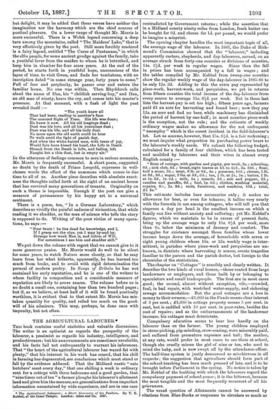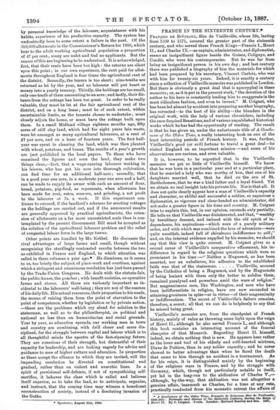THE AGRICULTURAL LABOURER.*
Tam book contains useful statistics and valuable discussions. The writer is an optimist as regards the prosperity of the labourer, a pessimist as regards his industry, intelligence, and productiveness; bat his announcements are sometimes unreliable, and his facts fail not unfrequently to warrant his inferences. That "the heart of the agricultural labourer has waxed fat with plenty," that his interest in his work has ceased, that his skill in farming has degenerated, are conclusions which must stand or fall by the evidence adduced. That the Midland rustic "eats butchers' meat every day," that one shilling a week is ordinary rent for a cottage with three bedrooms and a good garden, that "ninetimes oat often" a farmer ploughs his labourer's allotment land and gives him the manure, are generalisations from imperfect information nnsustained by wide experience, and are in one case • The Agricultural Labourer: a Short Summary of him Poeition. By T. B. Sebbel, of the Inner Temple. London. Allen and Co. 1887.
contradicted by Government returns ; while the assertion that in a Midland county ninety miles from London, fresh batter can be bought for 9d. and cheese for ld. per pound, we would prefer to imagine a misprint.
The opening chapter handles the most important topic of all, the average wage of the labourer. In 1881, the Duke of Rich- mond's Commission showed that the "labourer," including apparently carters, shepherds, and day-labourers, earned, on an average struck from forty-one counties or divisions of counties, 14e. 21d. per week in regular wages. Since then the fall in prices has been accompanied by a fall in wages ; and the tables compiled by Mr. Kebbel from tweny-one counties show the regular weekly wage of the day-labourer in 1885-86 to be only 12s. 3d. Adding to this the extra pay represented by piece-work, harvest-work, and perquisites, we get in returns from fifteen counties the total income of the day-labourer from every source to average 15s. 81d. per week. But in these last lists the harvest-pay is set too high ; fifteen years ago, farmers paid £1 an acre for harvesting and found beer ; now they pay 12e, an acre and find no beer, while machinery has diminished the period of harvest by one-half ; in most counties piece-work is the exception, not the rule; and the estimate of weekly ordinary wages makes no allowance for the not unfrequent " nnemploy " which is the sorest incident in the field-labourer's lot. Let us assume, however, that 15s. 8P. is a fair reckoning ; we must inquire what proportion Be purchasing power bears to the labourer's weekly needs. We submit the following budget, calculated for a family of four children, which has been tested and modified by labourers and their wives in almost every English county :- " Rent of cottage, with garden and pigsty, per week, 2a. ; schooling, 6d. ; siok club, 6d.; bread, eight loaves at 4d. to 44d., 2s. 10d. ; floor, half a stone, 9d.; meat, 6 lb. at 8d., 4s. ; potatoes, 10d.; cheese, 1 lb. at 8d., 8d.; sugar, 2 lbs. at 3d., Gd.; tea, lb. at 2a., is.; butter, 1 lb. at le. 6d., le. 6d. ; milk, le. ; treacle, 3d. ; salt and pepper, 2d.; candles and paraffin, 6d.; feel, is. 6d.; olothee, washing material, repairs, &a., 2s. 8d.; tools, furniture, and sundries, 10d.; total, 21 2a."
This estimate includes bare necessaries only ; it makes no allowance for beer, or even for tobacco; it tallies very nearly with the formula in use among cottagers, who will tell you that sixpence a day per head is the smallest income on which a family can live without anxiety and suffering ; yet Mr. Kebbers figures, which we maintain to be in excess of present facts, bring up the average wage to only 15s. 81d. per week, more than 6s, below the minimum of decency and comfort. The struggles for existence amongst those families whose lower income keeps down the average, of households with seven or eight young children whose 10s. or 12s, weekly wage is inter- mittent, in parishes where piece-work and perquisites are un- known, in districts where harvesting is scarce, create tragedies familiar to the parson and the parish doctor, but foreign to the chronicles of the statistician.
The chapter on "Cottages" is sensibly and clearly written. It describes the two kinds of rural homes,-those rented from large landowners or employers, and those built by or belonging to speculators and small tradespeople. The first are in most cases good; the second, almost without exception, vile,-crowded, foul, in bad repair, with wretched water-supply, and sickening sewage accommodation. But the good cottages are a loss in money to their owners ;-£1,000 in the Funds means clear interest of 3 per cent.; 21,000 in cottage property means 5 per cent, in rent, but is saddled with 10 per cent, in poor-rates, besides the cost of repairs; and as the embarrassments of the landowner increase, his cottages must deteriorate.
Compulsory education seems to bear less hardly on the labourer than on the farmer. The young children employed in stone-picking, pig-minding, crow-scaring, were miserably paid, and suffered from premature exposure and toil ; the mother, at any rate, would prefer in most cases to see them at school, though she cruelly misses the girl of nine or ten, who used to mind the baby, and is now swept off by the attendance-officer. The half-time system is justly denounced as mischievous in all respects ; the suggestion that agriculture ebould form part of the school-teaching has been mach pressed of late, and is to be brought before Parliament in the spring. No notice is taken by Mr. Kebbel of the loathing with which the labourers regard the compulsory payment of school-pence ; it is the bitterest, because the most tangible and the most frequently recurrent of all his grievances.
The vexed question of Allotments cannot be answered by citations from Blue-Books or responses to circulars so much as by personal knowledge of the labourer, acquaintance with his habits, experience of his productive capacity. The system has undoubtedly been to some extent a failure in the past. Of the 389,000 allotments in the Commissioner's Return for 1886, which bear to the adult working agricultural population a proportion of 47 per cent., many are unlet and find no applicants. But the causes of this are beginning to be understood. It is acknowledged, first, that their rents have been too high : the returns are silent upon this point ; in our own experience, the rent paid for allot- ments throughout England is four times the agricultural rent of the district. Secondly, the tenure is too short ; nine-tenths are returned as let by the year, and no labourer will pat heart or money into a yearly tenancy. Thirdly, the holdings are too small, only one-tenth of them amounting to an acre ; and lastly, their dis- tance from the cottage has been too great. In order to be really valuable, they must be let at the fair agricultural rent of the district, and on a long lease; must be of each extent, within ascertainable limits, as the tenants choose to undertake ; must closely adjoin the home, or must have the cottage built upon them. In a small Midland village eighteen months ago, fifty acres of stiff clay land, which bad for eight years lain waste, were let amongst as many agricultural labourers, at a rent of 21 per acre, and on a lease of fourteen years. The first half. year was spent in cleaning the land, which was then planted with wheat, potatoes, and beans. The results of a year's growth are just published in the local papers. To those who have examined the figures and seen the land, they make two things clear,—first, that a wagsearning labourer working in his leisure, who has got his acre into thorough cultivation, can find time for an additional half-acre; secondly, that in a good year one acre, in a moderate year one acre and a half, can be made to supply its owner with such an amount of flour, bread, potatoes, pig-food, as represents, when allowance has been made for rent, rates, manure, and grinding, a net profit to the labourer of 7s. a week. If this experiment con- tinues to succeed, if the landlord's schemes for erecting cottages on the holdings are carried out, and if the announced results are generally approved by practical agriculturists, the exten- sion of allotments on a far more unrestricted scale than is con- templated by the present Government Bill must be accepted as the solution of the agricultural labourer problem and the relief of congested labour force in the large towns.
Other points are handled by Mr. Kebbel. He discusses the rival advantages of large farms and small, though without recognising the startlingly contrasted results between the two as exhibited in France and England, to which attention was called in these columns a year ago.* He dismisses, as it seems to us, too briefly the subject of piece-work and overtime, against which a stringent and unanimous resolution has just been passed by the Trade-Union Congress. He deals with the statute-fair, the public-house, the poacher ; with benefit societies, co-operative farms and stores. All these are variously important as in- cidental to the labourers' well-being; they are not of the essence of his daily life. His actual resources,their proportion to his needs, the means of raising them from the point of starvation to the point of competence, whether by legislation or by private action, —these are the problems which cry aloud for solution to the statesman, as well as to the philanthropist, on political and national no less than on humanitarian and social grounds. Year by year, as education spreads, our working men in town and country are combining, with drill closer and more dis- ciplined, for the struggle between capital and labour which is to all thoughtful minds the spectre of the fast-ripening future. They are conscious of their strength, but distrustful of their capacity for leadership, and are looking eagerly for advice and guidance to men of higher culture and education. In proportion as these accept the alliance to which they are invited, will the impending revolution be directed on constitutional and gradual, rather than on violent and anarchic lines. In a spirit of previsional self-defence, if not of sympathising self- sacrifice, it behoves the class which is called and believes itself superior, so to take the lead, so to anticipate, organise, and instruct, that the coming time may witness a beneficent reconstruction of society, instead of a desolating invasion of the Goths.
• guested..., August 21d, Ms.



































 Previous page
Previous page